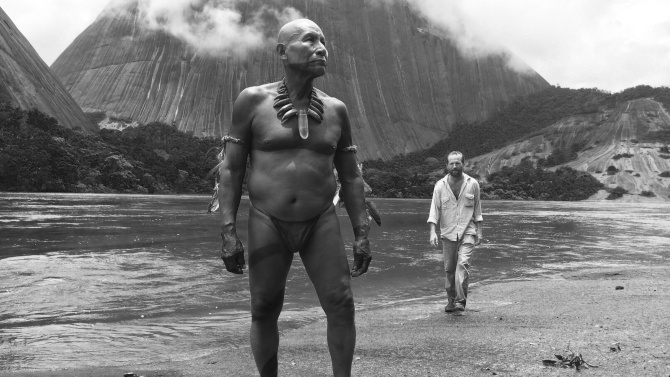MAR DEL PLATA – Having won the biggest prize at Cannes Directors’ Fortnight, Colombian Ciro Guerra’s “Embrace of the Serpent” – a ravishing but unequivocal put-down of white invaders’ obliteration of the Amazon’s indigenous peoples – took the top Golden Astor at Argentina’s 30th Mar del Plata Festival on Saturday.
Fest wrapped with 120,000 spectators, and far more industry heft and presence thanks to a new LoboLab co-pro forum, which saw a select but high-caliber presence of potential co-producers, largely from Latin America, descend on Mar del Plata’s grandiose Hotel Provincial to review projects.
In a new kudo, Guillermo Francella, star of Pablo Trapero’s Venice director winner “The Clan” – where he plays Arquimedes Puccio, the patriarch of a well-to-do Buenos Aires family who was allowed to abduct and murder victims under and after Argentina’s dictatorship – received fest’s first Alfredo Alcon Award. Plaudit is a sign of fest’s drive to pump up its star presence.
Rave reviewed – “majestic,” Variety announced – “Embrace of the Serpent,” repped by Films Boutique, served as a reminder of the brace of big plaudits at big fests won by Latin American movies in a milestone 2015 when the region broke through to definitive international recognition from festival programmers and juries alike.
Another title, Pablo Larrain’s Berlin Grand Jury Prize winner “The Club,” about priests sheltered from justice by the Catholic Church, took best actor for its ensemble cast (including Alfredo Castro, co-star of Venice Golden Lion winner “From Afar”).
Playing towards year-end, however, one of Mar del Plata’s International/Latin American competition hallmarks is its mix of already-prized titles, by common consensus among the year’s standouts, and lesser-known propositions. This blend played out in Saturday’s kudos roll. Among a vertiginous litany of official and unofficial plaudits, the biggest winners were most probably Ariel Rotter’s “Incident Light,” just starting its festival run, “Koza,” “Santa Teresa & Other Stories,” from Nelson Carlo de los Santos Arias, Argentine directors Benjamin Naishtat and Fernando Salem, among pix-in-post, “Black Frost” and “The Corroborators,” and among projects, “The Settlers,” a revisionist Chilean Western.
UDI sold, near new – it played Toronto – shot in b/w, and autobiographical, its builds on Rotter’s own family history, “Incident Light” takes the stuff of melodrama and creates a glancing social-issue chronicle. Erica Rivas, in as very different register from her turn as a firebrand bride from hell in the last part of “Wild Tales,” plays a young widow, courted for second marriage before she has time to mourn her dead husband. This is Argentina, the ‘60s, when the natural state for a woman, let alone a mother, is marriage.
Mar del Plata best director winner, Slovac Ivan Ostrorochovsky’s docu-fiction “Koza,” a boxer comeback tragicomedy, played Berlin’s Forum.
A noirish docu/fiction movie from Dominican filmmaker Nelson Carlo De Los Santos Aria, and probably the most out-there of a flurry of adaptations of great Chilean novelist Roberto Bolaños, “Santa Teresa & Other Stories” adapts “2666,” which Bolaños left unfinished, a novel inspired by the femicides of a Ciudad Juarez, with multiple narrators contributing shards of literary texts, and records of violence.
Benjamin Naishtat’s 1835-set “El Movimiento,” his follow-up to Berlin competition player “History of Fear,” won Fest’s Argentina Competition: Fernando Salem’s pop art road movie/identity comedy, “How Most Things Work,” one of the higher-profile world premieres at the Argentine resort, took best director.
Produced by Barbara Francisco’s El Pasto, which co-produced Santiago Mitre’s “The Student,” one of the most talked-up Latin American debuts of recent years, Work In Progress winner “The Black Frost” sees Maximiliano Schonfeld return to the Entre Rios region of “Germania” for a rural faith-issue drama which won the Buenos Aires Lab (BAL) Arte Prize in 2012.
99% shot, supported by INCAA Argentine Film Institute funding and a docu-feature which adopts the form and mission of a noirish thriller, Luis Bernardez’s “The Corroborators” won a mention having been presented Thursday at Mar del Playa’s Work in Progress.
It sets out to establish that a shadowy cabal of late 19th century eminence grises, based out of Buenos Aires’ Jockey Club and known as the Corroborators, conspired to ensure that the great new buildings of Buenos Aires’ Belle Epoque were modeled on Paris originals. The production will say a lot about national identity, the aspirations of Buenos Aires, Bernardez promised.
Buzzed up from before the co-pro meeting began, Chilean Western “The Settlers,” from editor-turned-director Fernando Galvez, and produced by director Dominga Sotomayor, looks set to lift the lid on how Chile’s central south was won: by the wholesale slaughter of Mapuche indigenous population.
The result could be as blistering as “Embrace of a Serpent.”
Sotomayor said at Mar del Plata that she aimed to set it up as a pan-Latin American co-production. Once Latin America looked in a near reflex action to Europe for co-production. As a LoboLab production panel underscored on Friday, Latin America’s new generation of producers look set, aided by minority co-production funds in Brazil and Colombia, and a consolidating network of acquaintances, to stand on its own-two feet.
Emilio Mayorga
